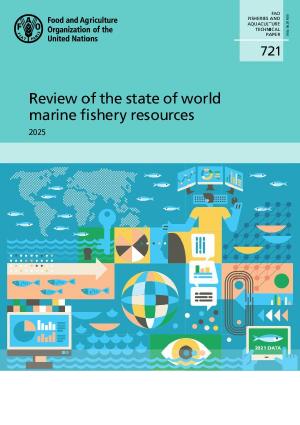State of World Marine Fishery Resources 2025

- 14 Jun 2025
In News:
The Food and Agriculture Organization’s (FAO) 2025 Report on the State of World Marine Fishery Resources, released during the UN Ocean Conference (UNOC3) in Nice, France, offers a comprehensive assessment of global fish stock sustainability, regional disparities, and governance challenges.
Key Findings:
- Global Sustainability: 64.5% of marine fishery stocks are fished within biologically sustainable levels, indicating modest improvement. However, 35.5% remain overexploited.
- Deep-Sea Species Vulnerability: Only 29% of deep-sea species are sustainably harvested, largely due to biological traits like slow growth, delayed maturity, and low reproductive rates. These characteristics impair recovery from overfishing.
- Migratory Shark Concerns: Of the 23 shark stocks assessed, 43.5% are overfished, especially in the tropical Indo-Pacific where they frequently become bycatch in tuna fisheries.
- Tuna Success Story: 87% of evaluated tuna and tuna-like species are sustainably fished, a result of effective regulation by Regional Fisheries Management Organizations (RFMOs).
- Regional Disparities: The northeast and southwest Pacific show high sustainability levels, while areas such as the Mediterranean and Black Sea lag, with only 35.1% of stocks sustainably managed.
- Data Gaps: Despite high reported sustainability (72.7%) in the eastern Indian Ocean, concerns remain due to insufficient species-specific stock assessments.
Governance and Policy Challenges:
- Illegal, Unreported and Unregulated (IUU) Fishing: Continues to threaten stock sustainability. IUU encompasses:
- Illegal: Breaches of domestic or international laws.
- Unreported: Failure to report or misreport catches.
- Unregulated: Conducted by vessels operating beyond jurisdictional authority, undermining conservation efforts.
- Subsidy Prohibitions (WTO Agreement):
- Bans financial support to vessels engaging in IUU fishing.
- Restricts subsidies for overfished stocks unless recovery measures are implemented.
- Prohibits aid for fishing in unregulated high seas zones.
Critical Analysis:
Positives:
- The rise in sustainable stocks signifies improved management awareness, particularly in regulated regions like the Pacific.
- Tuna fisheries demonstrate successful use of scientific tools—catch reporting and onboard observers—under RFMOs.
- The global survey included over 600 experts across 90 nations, lending credibility and robustness.
Negatives:
- Deep-sea stocks remain acutely overfished and biologically vulnerable.
- Shark species, integral to marine food webs, continue to suffer from bycatch and poor regulatory coverage.
- Monitoring shortfalls in Southeast Asia and African coasts prevent precise biomass estimation and conservation action.
- Weaker implementation and unregulated artisanal practices challenge sustainability in Mediterranean and Black Sea regions.
Recommendations for Sustainable Fisheries Governance:
- Empower RFMOs with real-time monitoring systems, electronic catch reporting, and observer programs.
- Adopt Ecosystem-Based Approaches that integrate climate resilience and biodiversity objectives.
- Strengthen Data Infrastructure in data-deficient regions with support from international bodies like the FAO and World Bank.
- Curtail Harmful Subsidies as per WTO protocols to reduce economic incentives driving overfishing.
- Promote Community Participation through co-management strategies and the development of Marine Protected Areas (MPAs).
